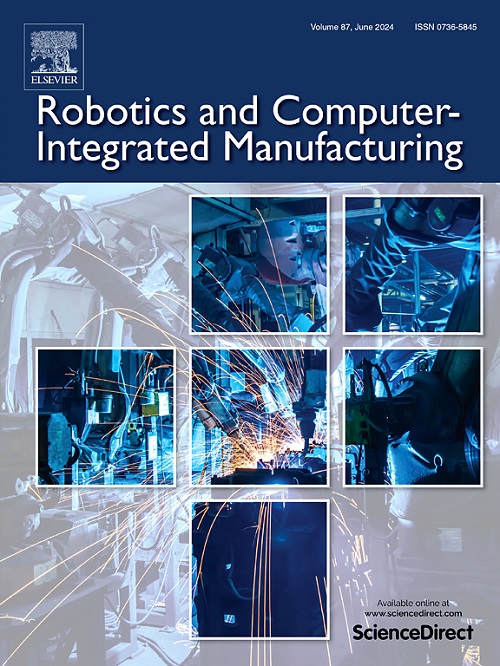通过灵活的分离和混合策略,增强在服务时间可用性意外变化下云制造服务组合的重构
IF 11.4
1区 计算机科学
Q1 COMPUTER SCIENCE, INTERDISCIPLINARY APPLICATIONS
引用次数: 0
摘要
云制造服务组合重构(CMSCR)是处理不可预测的服务异常,保证云制造系统在动态环境下顺利运行的重要过程。考虑到变更发生时CMfg系统服务提供商(cmsp)的占用状态,重构只能利用cmsp的可用时间,即一组可用服务时间窗口(astw)来组织。在传统的CMSCR研究中,任务被假设以固定的批量处理,这将导致一些astw不可用。这不可避免地会导致CMfg资源的利用率不足,从而减少了重新配置的空间。为了解决这一问题,我们在CMSCR中引入了灵活的分割和混合策略,旨在通过提高资源利用率来提高重构能力。本文首先分析了四种典型的astw意外变化及其重构的响应条件。其次,提出了一种具有灵活分割和混合策略的增强CMSCR方法(SCRTW-SI)来处理astw的意外变化。此外,为了进一步提高重构性能,设计了一种新的基于松弛的插入机构。所考虑的CMSCR问题用一个多目标混合整数规划模型来表述。在此基础上,提出了一种基于模因算法的多目标服务组合重构算法(MOSCRMA),并对其中的具体方案进行了阐述。通过大量的数值实验验证了其性能。最后,通过实例分析验证了该方法的适用性和优越性。本文章由计算机程序翻译,如有差异,请以英文原文为准。
Enhancing reconfiguration of cloud manufacturing service composition under unexpected changes in service time availability by flexible splitting and intermingling strategies
Cloud manufacturing service composition reconfiguration (CMSCR) is an essential process for handling unpredictable service exceptions to ensure the smooth operation of the cloud manufacturing (CMfg) system in a dynamic environment. Considering the occupied status of service providers of a CMfg system (CMSPs) at the time of change occurrence, the reconfiguration can be organized only with the available time of CMSPs, i.e., a set of available service time windows (ASTWs). In traditional CMSCR studies, tasks are assumed to be processed in fixed size of batches, which will lead to the unavailability of some ASTWs. This inevitably results in the insufficient utilization of CMfg resources and leaves less room for reconfiguration. To handle this problem, we introduce flexible splitting and intermingling strategies in CMSCR, aiming to improve the reconfiguration capacity by increasing resource utilization. This paper first analyzes four typical types of unexpected changes in ASTWs and their response conditions for reconfiguration. Next, an enhanced CMSCR approach with flexible splitting and intermingling strategies (SCRTW-SI) is proposed to handle the unexpected changes in ASTWs. In addition, a novel slack-based insertion mechanism is developed to further improve the reconfiguration performance. The CMSCR problem under consideration is formulated with a multi-objective mixed integer programming model. And a multi-objective service composition reconfiguration algorithm based on memetic algorithm (MOSCRMA) is proposed, in which some problem-specific schemes are elaborated. The performance is validated through extensive numerical experiments. Finally, a real-world case is analyzed to demonstrate the applicability and superiority of the approach.
求助全文
通过发布文献求助,成功后即可免费获取论文全文。
去求助
来源期刊
CiteScore
24.10
自引率
13.50%
发文量
160
审稿时长
50 days
期刊介绍:
The journal, Robotics and Computer-Integrated Manufacturing, focuses on sharing research applications that contribute to the development of new or enhanced robotics, manufacturing technologies, and innovative manufacturing strategies that are relevant to industry. Papers that combine theory and experimental validation are preferred, while review papers on current robotics and manufacturing issues are also considered. However, papers on traditional machining processes, modeling and simulation, supply chain management, and resource optimization are generally not within the scope of the journal, as there are more appropriate journals for these topics. Similarly, papers that are overly theoretical or mathematical will be directed to other suitable journals. The journal welcomes original papers in areas such as industrial robotics, human-robot collaboration in manufacturing, cloud-based manufacturing, cyber-physical production systems, big data analytics in manufacturing, smart mechatronics, machine learning, adaptive and sustainable manufacturing, and other fields involving unique manufacturing technologies.

 求助内容:
求助内容: 应助结果提醒方式:
应助结果提醒方式:


